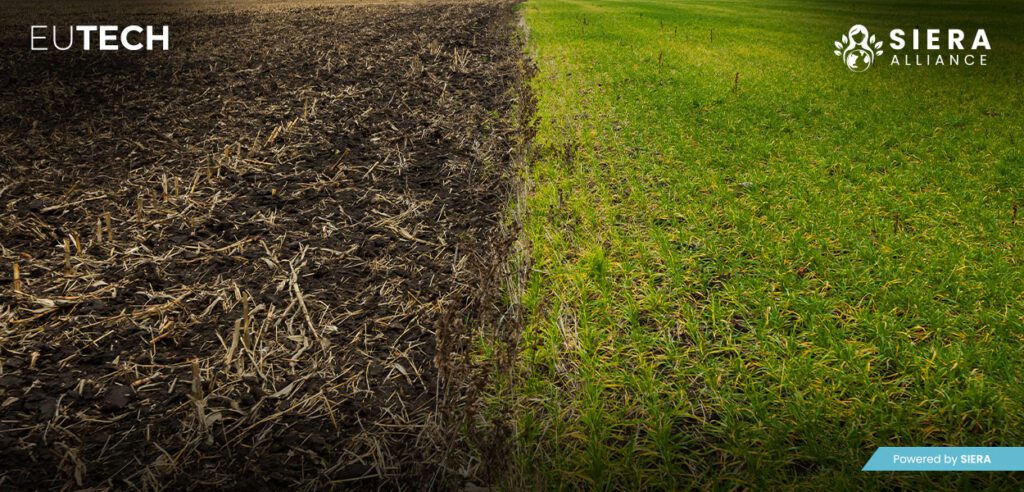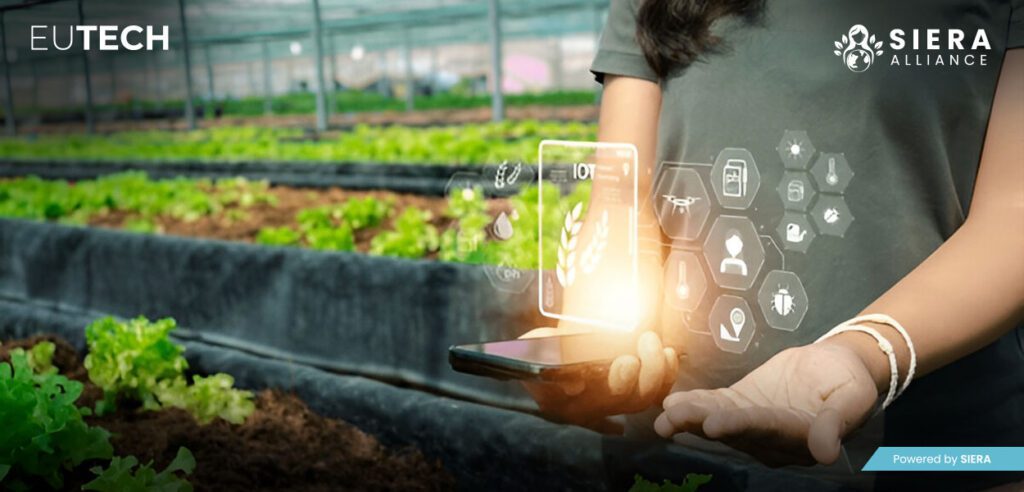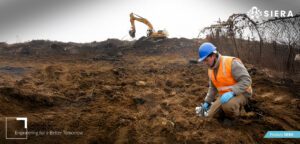On 31st January 2025, the EUTECH – Agriculture & Food Council powered by SIERA Alliance hosted an enlightening webinar titled “Innovative Agri-Tech Infrastructure: Paving the Path to Sustainable Agriculture.” This session explored how agri-tech infrastructure can revolutionize farming by enhancing sustainability and efficiency. The spotlight was on Impact I1 Service (Sustainable Infrastructure) from the I-ESG Framework of SIERA Alliance, which emphasizes the importance of integrating eco-friendly infrastructure to create sustainable farming solutions. The webinar featured Antonia Sophie Modersohn as the keynote speaker, and panelist Lou Seigneur provided actionable insights on how technology and innovation in infrastructure can help farmers reduce environmental impact while improving productivity.
What is the I-ESG Framework and How Does it Relate to Agri-Tech?
The I-ESG Framework by SIERA Alliance simplifies ESG reporting by directly aligning corporate actions with the Sustainable Development Goals (SDGs). Using the Periodic Table of Impact, businesses can easily identify key focus areas—such as water management, sustainable infrastructure, and climate action—and implement practical solutions. Unlike traditional ESG frameworks, the I-ESG Framework includes Impact, expanding the scope to areas like gender equality, urban mobility, and sustainable cities, providing a more holistic view of sustainability. By bridging the gap between ESG and SDGs, the I-ESG Framework enables companies to take targeted actions and create measurable impact while contributing to global sustainability goals.

Key Challenges in Agri-Tech Infrastructure
The agricultural industry faces several challenges that impact sustainability and resilience in farming. The panel discussed various factors influencing agri-tech infrastructure and offered insights into potential solutions:
1. Water Mismanagement and Inefficient Irrigation Systems
Water scarcity is a critical issue for agriculture, particularly in regions with dry climates. Agriculture accounts for 24% of water abstraction in the EU, and improper water usage can result in pollution and soil salinization. Efficient irrigation systems are crucial to ensuring sustainable water use while maintaining crop productivity.
2. Soil Degradation and Nutrient Loss
Soil erosion and nutrient imbalance are serious threats to agricultural productivity. In Europe, 24% of the land has been subject to erosion, and 74% of agricultural land suffers from nutrient imbalance. Regenerative agriculture practices such as cover cropping and reduced tillage are effective in restoring soil health and increasing agricultural sustainability.
3. Agricultural Runoff Pollution
The misuse of fertilizers and pesticides leads to nutrient pollution, damaging aquatic ecosystems. In Germany, one-sixth of groundwater bodies are threatened by nitrate pollution, and many of Europe’s surface waters are in poor ecological condition. This highlights the need for better waste management and pollution control technologies.
4. Inadequate Waste Management and Resource Recovery
Agricultural waste is a significant issue, with EU agriculture generating approximately 700 million tons of waste annually. Much of this waste is not properly recycled or reused, exacerbating environmental degradation. Circular economy models that focus on waste-to-resource strategies, such as converting agricultural waste into bioenergy or compost, are essential for reducing environmental impact.
5. Biodiversity Loss Due to Monoculture Practices
Monoculture farming practices result in habitat loss and the decline of biodiversity. As outlined in WWF’s Living Planet Report 2024, biodiversity has declined by 73% since 1970, primarily due to the expansion of monoculture farming. It is crucial to adopt nature-positive farming practices to preserve ecosystems and promote biodiversity.

Solutions and Recommendations for Agri-Tech Infrastructure
The panel highlighted several innovative solutions to address the challenges in agri-tech infrastructure, emphasizing the importance of sustainability and resilience:
1. Precision Irrigation and Groundwater Monitoring
The integration of IoT-based smart irrigation systems and groundwater monitoring can significantly reduce water usage, increase crop yield, and promote sustainable water management. Water conservation technologies can help monitor and optimize water use, improving both crop productivity and sustainability.
2. Regenerative Soil Practices
Implementing regenerative agriculture practices such as cover cropping and reduced tillage can restore soil health, increase soil organic matter, and enhance agricultural productivity. Grassland restoration has proven effective in improving soil health, reducing the need for synthetic fertilizers, and providing carbon sequestration benefits.
3. Circular Economy Models for Agricultural Waste
Incorporating circular economy principles in agriculture involves turning waste into valuable resources, such as converting crop residues into bioenergy or organic fertilizers. This approach helps reduce greenhouse gas emissions and provides a sustainable way to manage agricultural by-products.
4. Biodiversity-Focused Farming Practices
Adopting agroecological approaches and promoting polyculture over monoculture farming can protect biodiversity, enhance ecosystem resilience, and reduce dependency on harmful chemicals. Biodiversity action plans and habitat connectivity initiatives can help restore natural habitats and support pollinator populations.
5. Green Financing and Sustainable Investment
Agri-tech infrastructure projects can benefit from green financing, which supports investments in sustainable agriculture technologies. By adopting impact investment consulting and pursuing sustainable finance initiatives, agricultural businesses can access funding for climate-resilient solutions.
Transformation Opportunities in Agri-Tech Infrastructure
Adopting agri-tech solutions presents several transformation opportunities for the agricultural sector:
| Transformation Area | Benefits | Statistics |
| Cost Savings and Efficiency | Reduces water waste, improves soil health, and enhances yields | Precision irrigation systems reduce water usage by 55% |
| Brand Reputation and Sustainability Leadership | Improves public image by aligning with sustainability and climate goals | Regenerative farming can reduce greenhouse gas emissions by 20% |
| Access to Green Financing | Attracts green investors and financing opportunities for sustainability projects | Denmark’s agricultural circular economy project reduces waste by 70% |
| Regulatory Compliance | Meets environmental regulations and contributes to achieving EU Green Deal goals | Implementing groundwater management and agricultural runoff control ensures compliance with EU sustainability regulations |
Best Practices for Agri-Tech Infrastructure
The panelists emphasized the following best practices for integrating sustainable agri-tech infrastructure:
Adopt Precision Agriculture: Implement smart irrigation and soil health monitoring technologies to optimize resource usage and enhance productivity.
Embrace Regenerative Practices: Use cover cropping, crop rotation, and reduced tillage to improve soil quality and increase carbon sequestration.
Promote Circular Economy: Convert agricultural waste into valuable resources like bioenergy and organic fertilizers to reduce waste and carbon emissions.
Incorporate Biodiversity Plans: Adopt nature-positive farming strategies to protect biodiversity and enhance ecosystem services.
Pursue Green Financing: Access green finance and impact investment to support the implementation of sustainable farming technologies.
Upcoming Events and Opportunities
Stay informed about future events hosted by the Agriculture & Food Council powered by SIERA Alliance. For more insights into agri-tech solutions, sustainability practices, and networking opportunities, visit the SIERA Alliance Event Calendar. Join us as we continue to advance sustainable agriculture.
Conclusion: A Sustainable Future for Agriculture
Integrating innovative agri-tech infrastructure is essential to addressing the complex challenges facing the agricultural sector. By adopting regenerative practices, implementing precision technologies, and embracing circular economy models, the industry can move towards sustainable agriculture and environmental sustainability. Collaborating with organizations like SIERA Alliance, EUTECH, and MuP Group can help stakeholders implement comprehensive sustainability strategies that benefit both the environment and the agricultural industry.
To learn more about how SIERA Alliance can support your journey toward sustainable agriculture, explore our website. Join us in building a sustainable and resilient future for agriculture.









